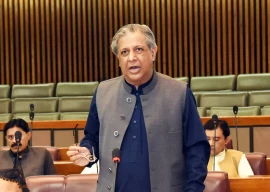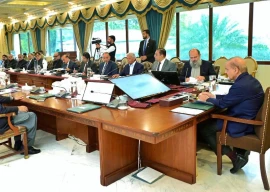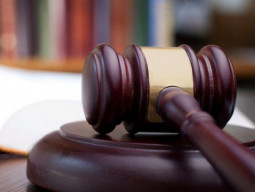
KARACHI:
Given the multiple blasts in Orangi on Wednesday evening, it is likely that cellular services will be suspended during Ashura this weekend. The police are, nevertheless, fearful that the terrorists may use an alternative method to create panic and cause havoc.
In the past, four kinds of devices have been used in bombs attacks - remote controls, mobile phones, timers and manual bombs. According to a Bomb Disposal Squad (BDS) report, mobile phones devices were found to be used in nine different bombs. Three of them were defused while the remaining claimed several lives.
The first time BDS experts and the police came across the mobile phone technology in bomb blasts was in 2004, after the attack on Karachi’s former corps commander Lt Gen Ahsan Saleem Hayat in Clifton. The experts found the bomb and defused it.
Apart from this bomb, the remaining bombs that use the mobile phone technology have exploded. None of them were planted in motorcycles, except for the one used in the blast near the imambargah in Abbas Town on Sunday.
Crime Investigation Department (CID) counter terrorism and financial crime investigation unit’s chief SSP Raja Umer Khattab said that the banned outfit, Jundullah, has experts who make bombs by connecting them with cell phones. However, another outlawed organisation, Punjabi Mujahideen, has also obtained the same expertise, he said, adding that this was confirmed during the investigation into Karachi University’s blast when their members were interrogated.
Senior police investigators believed that the outlawed Punjabi Mujahideen was involved only in Karachi University’s blast, while the outlawed Jundullah was involved in the remaining bomb blasts. “All outlawed organisations, including Lashkar-e-Jhangvi, are experts in making remote-controlled devices because they can be made very easily,” said Khattab. “However, making a mobile-phone-controlled device is technical and it can only be carried out by an expert engineer,” he added.
“I don’t think the terrorists will not do anything,” Khattab admitted, explaining that a device needs signals which can be sent through a walkie-talkie, a cell phone, or even a landline number.

Mobile-phone-controlled devices are often used during processions that take time so they can fix the device according to the procession’s schedule, he said. In such cases, the terrorists have an advantage that they can detonate the bomb from any part of the world.
“Detonating a bomb through mobile phones takes times so they [terrorists] try to use them in slow events, such as processions or prayers,” he said. “The device has a password that the terrorist calls on and the bomb only goes off once the password has been entered. All this takes time.”
CID’s SP Mazhar Mashwani agreed that remote-controlled devices are easier but terrorists usually avoid them because of their limited range. “Remote-controlled devices are risky for the terrorist because he has to stay close by to set off the bomb,” he said. “Handling a remote-controlled bomb is harder because the bomber has to make sure not to push the button while assembling the bomb,” he added.
Referring to the bomb that was defused outside a shopping mall near Dalmia, Mashwani said that it was connected to a wireless phone. “Wireless phones are too big and their battery dies very quickly,” he explained.
Cases of mobile-phone-controlled bombs
The terrorists used cell phones to detonate bombs on Muharram 8, 9 and 10 in 2010. Another mobile-phone-connected bomb was defused in Shadman Town on Muharram 14, 2010, when two suspected mistakenly dropped it from the motorcycle.
Another such bomb was defused in January, 2010, when an arrested Jundullah man tipped off the Special Investigation Unit, while a similar device was used in the bombing in the Jinnah hospital parking lot.
In December 2010, the terrorists also used a mobile phone to set off the bomb planted in the hall where Imamia Student Organisation members were offering Friday prayers.
The bomb used to attack the imambargah in Abbas Town on Sunday was also detonated with a mobile phone.
Published in The Express Tribune, November 22nd, 2012.
COMMENTS (1)
Comments are moderated and generally will be posted if they are on-topic and not abusive.
For more information, please see our Comments FAQ




























































yet what has the govt did to safeguard its citizens ? all the above data seem from 2010, where are the data of 2011 & 2012 ? & where are those Chinese imported explosive screening devices ? vehicles...Mr Malik....? millions spent & pocketed ?